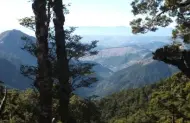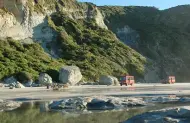Kahurangi National Park
New Zealand’s second largest national park is located in the north-west of the South Island and can be accessed from Motueka, near Nelson or Takaka and Murchison. The park is of great interest to cavers, as it is home to the longest and oldest caves in New Zealand and beneath Mt Arthur, lies the deepest cave system in the Southern Hemisphere. Fossils and fascinating rock formations abound in the park and it was here that New Zealand’s oldest fossil was found. The variety geological features has created a range of ecosystems within this large park, resulting in Kahurangi containing the most diverse range of flora found in New Zealand. The best way to explore the park is on foot and the Department of Conservation website has detailed information on a number of walking tracks, including the Heaphy Track, one of New Zealand’s Great Walks. The Heaphy track is the longest of all the great walks, taking 4 to 6 days to travel the 78.4km well-marked trail. Along the way you pass through a variety of landscapes from beech forests to tussock grasslands, then the lush green podocarp forests before reaching the coastline with its tropical looking Nikau Palms.

Alpine Splendour Day Tour with Wine, Art & Wilderness - Includes Lunch
The access road to Mount Arthur – the second highest mountain in Kahurangi National Park – climbs to almost 1,000 metres and is an awesome activity on its own, affording marvellous views and hinting at what is to follow. Hike through an ever-improving and diverse birdlife becomes apparent with Kea, Weka often as low as the carpark then bellbird, the tiny rifleman, tomtit, and the fearless bush robin entertain all thanks to the volunteer group Friends of Flora and their trapping programme.
This part of Kahurangi National Park is one of New Zealand’s most interesting for visitors, with its impressive mountain and bush scenery, remarkable botany and geology, and interesting human stories. The Mount Arthur area has many special geological features. Nowhere else in New Zealand has such a complex series of ancient rocks been eroded into such a distinctively different landscape.

Kahurangi/Golden Bay Private Scenic Flight with Farewell Spit Eco Tour
Tracking west into the Kahurangi mountains, enjoy a flight over unspoilt country before your pilot lands at a remote alpine location, where you can enjoy the overwhelming surrounds of New Zealand’s second largest National Park. Following your mountain landing, you descend further north west to Golden Bay, and track the beautiful coastline to land in the remote settlement of Puponga, situated at the base of Farewell Spit.
Here join Farewell Spit Eco Tours for a private guided tour of Farewell Spit, the natural sandspit that spans approximately 26 km above the tide mark across the top of the South Island. Hear the history of Puponga and New Zealand’s first Radar Station. See where whales strand and uncover the mystery of the migrant waders. During the summer there are up to 20,000 godwits and 30,000 knots at the Spit, as well as other northern migratory birds, New Zealand natives and introduced species.